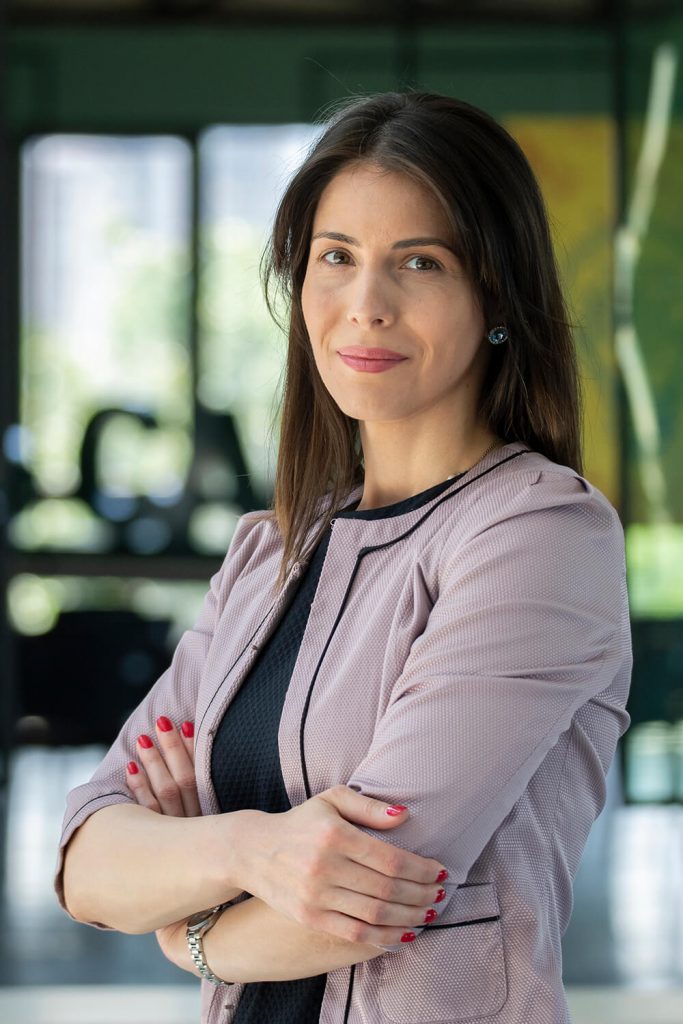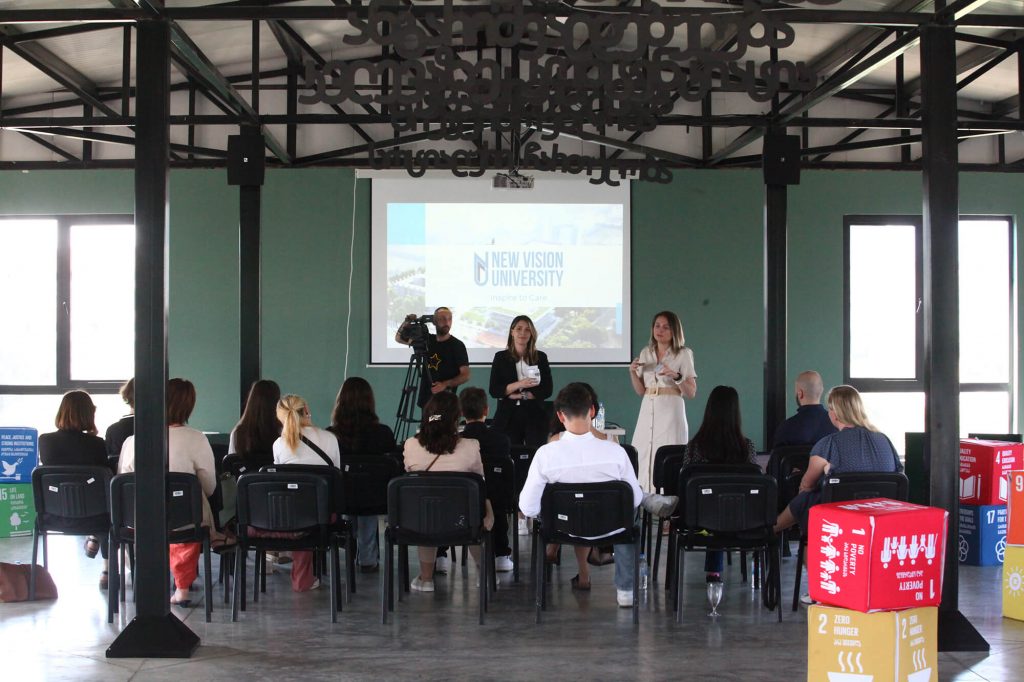Equal Opportunities to Receive Education at New Vision University

Developing a culture of civic responsibility and social sustainability is one of the top priorities of New Vision University. Of the 4000 students enrolled at the university, 85% are international, coming from 91 countries. Our faculty is also diverse, as 30% of our professors are international.
At New Vision University, adhering to the principles of equal access and impartiality is crucial. The university provides individual-centered learning for students with different needs, contributes to environmental sustainability by raising public awareness and promotes economic development and welfare.

University Chancellor Ekaterine Azarashvili speaks about New Vision University’s outlook towards corporate sustainability.
What is the added value of corporate sustainability, and how important is it in your work?
Corporate sustainability is a crucial aspect of our organization’s activities. It is part of our mission and is reflected in strategic priorities. The university activities are based on a very different business model. We believe that to be a successful educator, you must lead by example. The university works in education, healthcare, finance and sports. We create high-quality, affordable services in all directions and promote a healthy lifestyle and fair values. Our slogan is “Inspire to Care.” We are committed to nurturing responsible citizens, allowing them to create the environment in which they desire to live.
Which sustainable development goals have you prioritized?
We have prioritized the sustainable development goals that align with the university’s areas of activity. These are the goals where we can make the most impact with our resources or expertise: Good Health and Well-Being (SDG 3); Quality Education (SDG 4); Reduced Inequalities (SDG 10); Peace, Justice and Strong Institutions (SDG 16); and Partnership for the Goals (SDG 17). Achieving Gender Equality (SDG 5) is one of the overarching priorities for the university. Each activity or project is carried out in accordance with the principles of gender equality. In all sectors where the university is represented, it oversees women’s empowerment. We are also increasing our efforts towards affordable and clean energy, sustainable consumption and production and climate sustainability.
The goals and activities of the university’s strategic plan are related to the SDGs. This plan allows us to design and implement strategic interventions that correspond to the sustainable development goals while simultaneously assessing the results and impact of our activities.
I would also like to highlight the university’s success in the Times Higher Education IMPACT Rankings. This international university ranking system assesses the results of university activities in terms of their contribution to the achievement of the United Nations Sustainable Development Goals. New Vision University is the only higher educational institution in Georgia that is represented in the 2023 edition. It ranks high in priority areas — 201–300 position in the world for SDG 3, Good Health and Well-Being.
You are also working towards SDG 3 – Good Health and Well-Being. Tell us more about the projects implemented in this respect.
Caring for others can be expressed in many ways, but you will probably agree that caring for health is a significant determinant of the well-being of society. The socio-emotional and mental state of people has a direct correlation with the daily impact they have on the environment.
The university is actively represented in the healthcare sector — it provides medical education and services. The university runs a non-profit university hospital. During the pandemic, we opened a health hub in our eco-campus focused on bringing all the services that are part of the mandatory medical check-up into a single space. Our task is to ensure quality and affordable medical services to the community. Additionally, our campaigns help raise awareness about preventive medical examinations.
The university has supported the implementation of a personalized healthcare program for women. We believe that access to women’s healthcare is necessary for the development of society. Due to its social importance, the program is available for everyone and is entirely free for 1000 teachers.
We have developed a check-up package for young athletes. Many children exercise and pursue a healthy lifestyle at the sports base of the university. Their health requires constant monitoring to ensure appropriate development.

Why did you decide to join the UN Global Compact, and why is it important to bring the private sector together to create a better world?
No matter how brilliant an idea is, realizing it requires uniting common interests and shared resources. The bigger the goal, the more commitment it requires from society. New Vision was founded as a “CIVIC” university, which means a community-oriented and caring institution. In our case, this is not an acquired habit—it is innate. The mission instructs us to empower individuals and expand their horizons through education, research and innovation. Expanding one’s horizons is necessary to see and adequately perceive the environment and developments from multiple perspectives.
When we heard about the UN Global Compact, we realized that what we were doing was part of this larger platform, so we decided to join it and make sharing our resources part of an even bigger strategy. Common values unite us, and the university always seeks and strengthens such networks.
What does implementing international standards in Georgian companies mean, and how important is membership in such platforms as the UN Global Compact? What would you say to the business companies? Why should they join this initiative?
Membership in an international platform allows the private sector to be constantly informed about the latest developments and trends and to adapt to them. Adaptability is vital. I believe that the private sector should create and develop what society needs the most, help people deal with challenges and at the same time, commit to introducing standards that are focused on environmental protection and sustainable consumption of natural resources, as well as respect and protect human rights, including labor rights and so on.
What is the role of the private sector in achieving sustainable development goals, and how important is a multisectoral partnership in this regard?
The private sector is characterized by greater flexibility and a higher degree of freedom, often initiating a wide range of interventions and campaigns. The more customers a company has, the more impact it can make with its products. When a business is responsible, it nurtures responsible behavior in consumers. All of these are crucial to achieving the Sustainable Development Goals.
Multisectoral partnerships are associated with consolidating resources and achieving common goals through joint efforts. I am not saying this because I represent the university. I believe that the development of any field, any of the 17 sustainable development goals, can be achieved only by strengthening the education component. Therefore, when we talk about multisectoral partnerships, I am implying the education sector.
What would you advise the start-up companies? Why should they start working and designing a business strategy reflecting the principles of corporate sustainability?
It is inevitable and directly affects the environment in which they will have to operate in the future.
What are your plans? What kind of projects do you plan to implement in the future?
One of our recent projects was dedicated to raising awareness of the UN Sustainable Development Goals in schools. In cooperation with the UN Global Compact Network Georgia and the greenest bank in Georgia, Procredit, we implemented a pilot project in two Tbilisi schools. Our task was to create groups in schools where the students and their parents, teachers, school administration and board representatives would be involved in the needs assessment and sustainable development project planning. The issue of waste recycling was identified as a priority issue in the schools. Therefore, our next step will be helping them implement the developed projects with our partners and business sector representatives. This is a community-driven initiative that we often use in our activities. After successfully implementing the pilot project, we will execute it in schools in Tbilisi and all regions of Georgia to increase its positive impact and attract more like-minded people for our mission to achieve the SDGs.




 Search
Search





